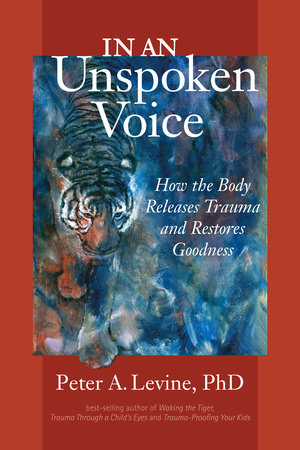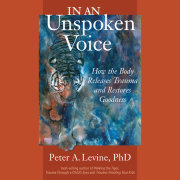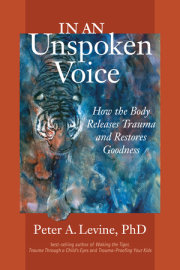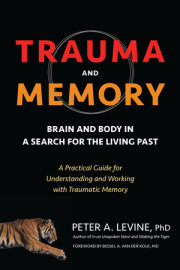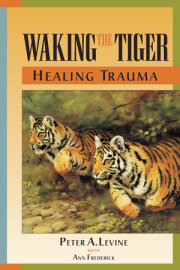“In An Unspoken Voice uses the author's experiences as a clinician and a student of comparative brain research to explore the nature and impact of trauma on the body and brain… Case study examples blend biology and body-oriented psychotherapy in a fine collection of insights highly recommended for college-level psychotherapy holdings.”
—Midwest Book Review
“In this masterpiece Peter Levine has captured the essence of trauma as residing in the ‘unspoken voice’ of our bodies. Combining a thorough study of animal ethology, brain research, and indigenous healing rituals with vast clinical knowledge, Levine provides a marvelous and original perspective on how trauma results in injuries that can be transformed and healed by attention to the natural healing powers of that reside deep within every human being.”
—Bessel van der Kolk, MD, medical director and founder of the Trauma Center at Justice Ressource Institute, director of the National Complex Trauma Treatment Network, and professor of Psychiatry at Boston University School of Medicine
"With this book Peter Levine secures his position in the forefront of trauma healing, as theorist, practitioner, and teacher. All of us in the therapeutic community—physicians, psychologists, therapists, aspiring healers, interested laypeople—are ever so much richer for this summation of what he himself has learned."
—Gabor Maté, MD, author of In The Realm of Hungry Ghosts: Close Encounters with Addiction
“Peter Levine’s work is visionary common sense, pure and simple.”
—Laura Huxley, lifetime partner and collaborator of Aldous Huxley
“Peter Levine’s first book, Waking the Tiger, changed the world of trauma treatment: somatic therapy, specifically Somatic Experiencing®, the name of the specific approach he developed, no longer alternative fringe practice, became a major player in the world of the mainstream psychotherapies. Like an anthropologist acquainting us with a different culture that he has made his own, Levine, in his new book, In an Unspoken Voice, systematically and engagingly initiates us into the ways of the body and the nervous system that animates it: how it works, what makes it tick, how to make friends with it, how to understand it, how to communicate with it and, last but not least, how to treat it and release it (and with it, us) from the hold of post-traumatic stress disorder (PTSD). No longer unspoken, all that is held in the body-–in trauma and in health, in psychosomatic illness and in resilience—is described, articulated and made coherent. The result is a masterful, fluent book that seamlessly moves between evolution, science, Polyvagal theory, mind-body practice, impassioned defense of our animal natures, self-disclosure and specific step-by-step guide to treating trauma and restoring resilience. It is erudite, it is impassioned, it is learned and it is accessible.”
—Diana Fosha, PhD, director of The AEDP Institute, co-editor of The Healing Power of Emotion: Affective Neuroscience, Development and Clinical Practice, and author of The Transforming Power of Affect: A Model for Accelerated Change
“To be traumatized is to be condemned to endless repetitions of unbearable experiences. In this beautifully written and engrossing book, Peter Levine explains how trauma affects our body and mind and demonstrates how to call upon the wisdom of our bodies to overcome and transform it. The accounts of his personal and therapeutic experiences, integrated with the essentials of the sciences of trauma and healing, are highly informative and inspiring. His distinctive voice should be widely heard by survivors, clinicians and scientists.”
—Onno van der Hart, PhD, Honorary Professor of the Psychopathology of Chronic Trauma, Utrecht University, Utrecht, The Netherlands, and co-author of The Haunted Self: Structural Dissociation of the Personality
“Like a wise old weaver Peter Levine painstakingly blends together strands of many dense colors into ever-fresh patterns emerging from his honed intelligence and fertile imagination. These strands comprise careful reflections on his own personal healing, his work with others, insights from studies with animals, different views from indigenous peoples here and elsewhere, various scientists exploring the biologies of the body, spiritual practices in many traditions and whatever else passes in front of his sparkling eyes. His first (and now iconic) book, Waking the Tiger, is now part of the canon for the education of therapists. This major new book is a welcome landmark in his long history of creating an intricate tapestry of Somatic theory and practice.”
—Don Hanlon Johnson, PhD, professor of Somatics at California Institute of Integral Studies, founder of the first accredited graduate studies program in the field, and author of Bone, Breath, and Gesture: Practices of Embodiment and Everyday Hopes, Utopian Dreams: Reflections on American Ideals
“For more than forty years, Peter Levine has gently, humorously, and with stunning simplicity, shown us how trauma responses are part of a brilliant psychological self-protection system; a protection system that we, professionals and laypeople alike, unwittingly block with our many ‘normal’ responses. If you want to grasp the essence of how and why the trauma response can help people heal, read this book. If you want to help a traumatized person lessen the impact of the trauma while it’s happening, read this book. If you want to understand your own journey through stress and trauma, read this book. If you want some trail markers for a path from the daze of dissociation to the reemergence of deep vibrant aliveness and spiritual feeling, read this book.”
—Marianne Bentzen, international trainer in Neuroaffective Psychotherapy, Copenhagen, Denmark
“Peter Levine conveys his profound scientific understanding of post-traumatic stress disorder (PTSD) so vividly that the reader can sense, feel and identify with the many traumatized children and adults he has worked with. Levine helps us to understand the complexity of PTSD seen from the outside as well as felt from the inside. He invites us into a spiritual dimension that draws equally on science and experience. Through his poetic style the reader is conducted from the built-in reactions of the nervous system to deep mental scars, and to how the skilled PTSD therapist can guide far-reaching healing processes. Levine’s understanding is vast in its scope, from an evolutionary understanding of the source of trauma to a spiritual dimension of how we as human beings can be strengthened by healing from trauma.”
—Susan Hart, Danish psychologist, author of Brain, Attachment, Personality: An Introduction to Neuroaffective Development and The Impact of Attachment: Developmental Neuroaffective Psychology
“This book stands as a worthy sequel to Levine's groundbreaking Waking the Tiger. He expands his concepts of the neurophysiological basis for trauma with a thorough review of the science of trauma and his own creative theories, providing rich insights for application to the business of healing. Valuable case studies illustrate the ‘whys’ of the behavior of the trauma victim, and useful tools help the therapist enlist the body in the process.”
—Robert Scaer, MD, author of The Trauma Spectrum and The Body Bears the Burden
“Peter Levine’s approach to understanding and healing trauma is innovative, vital and thoroughly creative. The map for therapy that he introduces is very helpful to any healer of trauma. Once again Levine reminds us that our evolutionary ancestors are not so removed from us. That we and the other animals are all one family and that we should learn from them, as our survival and sanity depends on it. Levine’s suggestion to change post-traumatic stress disorder (PTSD) to post-traumatic stress injury (PTSI) is much more realistic as we are healing the hurt and not the disorder.”
—Mira Rothenberg, author of Children with Emerald Eyes and founder of Blueberry Treatment Centers
“In the detailed, thoroughly researched, and easy-to-read book, In An Unspoken Voice, Peter A. Levine gives readers a fascinating new perspective on dealing with and healing from stress and trauma. … Anyone working in the holistic health and wellness field, or even a contemporary health care practitioner, will derive great amounts of knowledge from this book that can be applied and practiced within their own healing environments.”
—CirclesOfLight.com
“In an Unspoken Voice is a life enhancing read.”
—Bipolar Disorder Batesy

